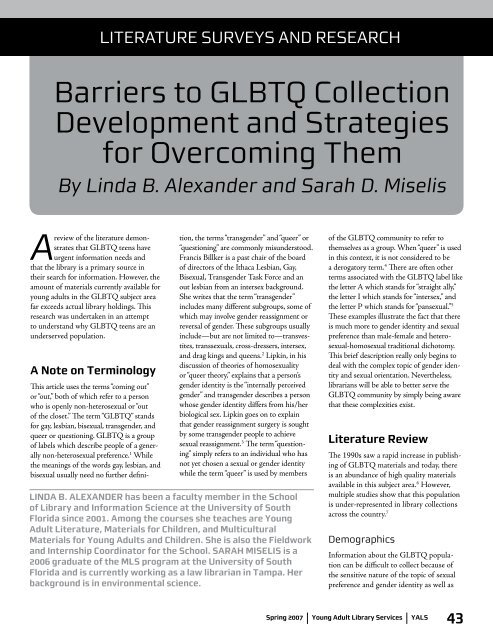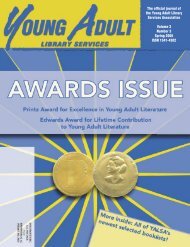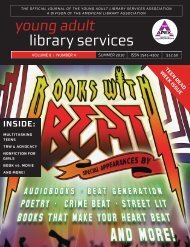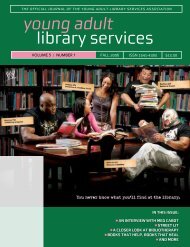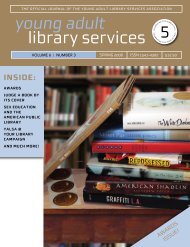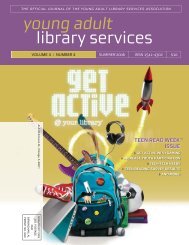Spring 2007 - YALSA - American Library Association
Spring 2007 - YALSA - American Library Association
Spring 2007 - YALSA - American Library Association
You also want an ePaper? Increase the reach of your titles
YUMPU automatically turns print PDFs into web optimized ePapers that Google loves.
LITERATURE SURVEYS AND RESEARCHBarriers to GLBTQ CollectionDevelopment and Strategiesfor Overcoming ThemBy Linda B. Alexander and Sarah D. MiselisAreview of the literature demonstratesthat GLBTQ teens haveurgent information needs andthat the library is a primary source intheir search for information. However, theamount of materials currently available foryoung adults in the GLBTQ subject areafar exceeds actual library holdings. Thisresearch was undertaken in an attemptto understand why GLBTQ teens are anunderserved population.A Note on TerminologyThis article uses the terms “coming out”or “out,” both of which refer to a personwho is openly non-heterosexual or “outof the closet.” The term “GLBTQ” standsfor gay, lesbian, bisexual, transgender, andqueer or questioning. GLBTQ is a groupof labels which describe people of a generallynon-heterosexual preference. 1 Whilethe meanings of the words gay, lesbian, andbisexual usually need no further definition,the terms “transgender” and “queer” or“questioning” are commonly misunderstood.Francis Billker is a past chair of the boardof directors of the Ithaca Lesbian, Gay,Bisexual, Transgender Task Force and anout lesbian from an intersex background.She writes that the term “transgender”includes many different subgroups, some ofwhich may involve gender reassignment orreversal of gender. These subgroups usuallyinclude—but are not limited to—transvestites,transsexuals, cross-dressers, intersex,and drag kings and queens. 2 Lipkin, in hisdiscussion of theories of homosexualityor “queer theory,” explains that a person’sgender identity is the “internally perceivedgender” and transgender describes a personwhose gender identity differs from his/herbiological sex. Lipkin goes on to explainthat gender reassignment surgery is soughtby some transgender people to achievesexual reassignment. 3 The term “questioning”simply refers to an individual who hasnot yet chosen a sexual or gender identitywhile the term “queer” is used by membersLINDA B. ALEXANDER has been a faculty member in the Schoolof <strong>Library</strong> and Information Science at the University of SouthFlorida since 2001. Among the courses she teaches are YoungAdult Literature, Materials for Children, and MulticulturalMaterials for Young Adults and Children. She is also the Fieldworkand Internship Coordinator for the School. SARAH MISELIS is a2006 graduate of the MLS program at the University of SouthFlorida and is currently working as a law librarian in Tampa. Herbackground is in environmental science.of the GLBTQ community to refer tothemselves as a group. When “queer” is usedin this context, it is not considered to bea derogatory term. 4 There are often otherterms associated with the GLBTQ label likethe letter A which stands for “straight ally,”the letter I which stands for “intersex,” andthe letter P which stands for “pansexual.” 5These examples illustrate the fact that thereis much more to gender identity and sexualpreference than male-female and heterosexual-homosexualtraditional dichotomy.This brief description really only begins todeal with the complex topic of gender identityand sexual orientation. Nevertheless,librarians will be able to better serve theGLBTQ community by simply being awarethat these complexities exist.Literature ReviewThe 1990s saw a rapid increase in publishingof GLBTQ materials and today, thereis an abundance of high quality materialsavailable in this subject area. 6 However,multiple studies show that this populationis under-represented in library collectionsacross the country. 7DemographicsInformation about the GLBTQ populationcan be difficult to collect because ofthe sensitive nature of the topic of sexualpreference and gender identity as well as<strong>Spring</strong> <strong>2007</strong> | Young Adult <strong>Library</strong> Services | YALS 43


